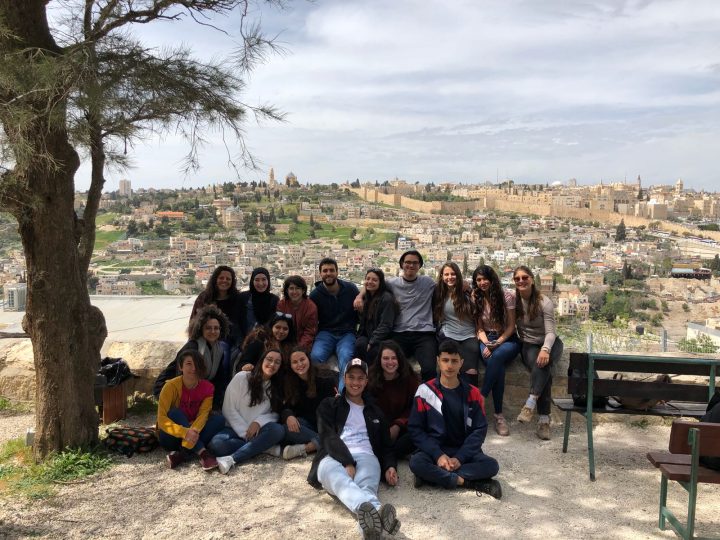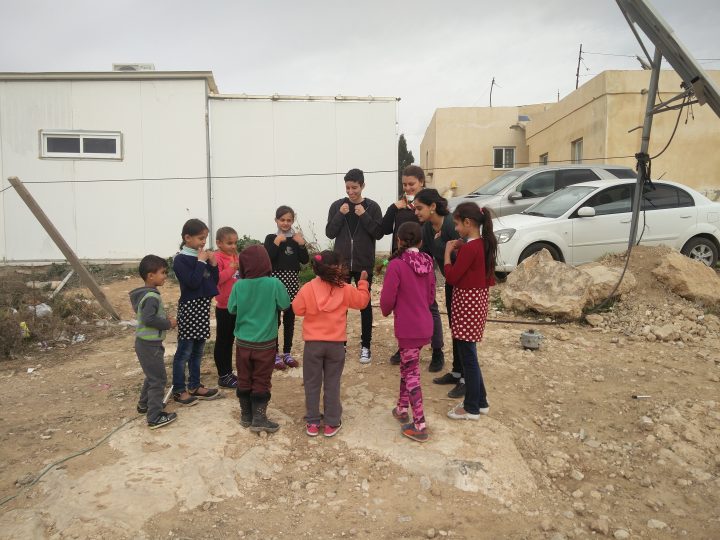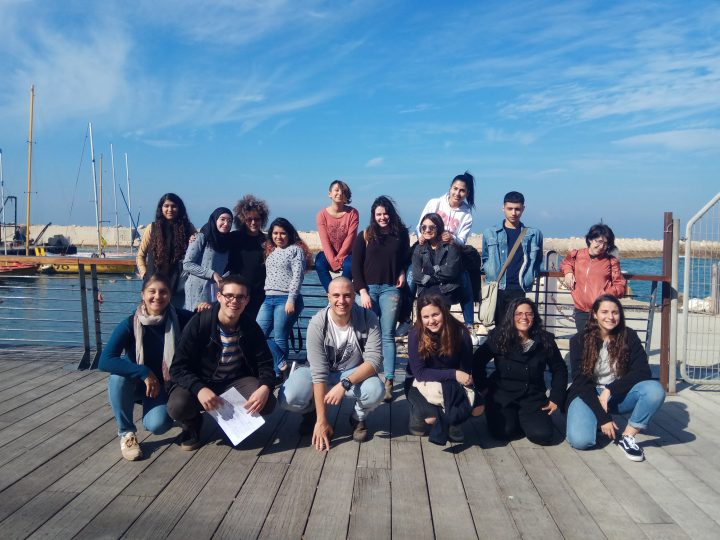
Community in Action, a bi-national group of high school graduates during a political tour in Jaffa – Photo © Sadaka-Reut
My name is Dina Gardashkin. I’m a Jewish Israeli, and the first time I learned what the word Palestinian really meant was at the age of 23.
Since I grew up in Haifa, a city known for its mixed population and co-existence, I was always aware of another identity. I understood this as Arab, but knew nothing about its national context. In school, we had never discussed this identity: where it came from and why there were Arabs living in the Jewish state. I had only heard over the news media of Palestinians being the ones who commit terror attacks. I had no background knowledge of where they came from or what they were trying to achieve.
My family had always stayed away from politics, and discussions of national or religious values were absent from our conversations. I believe this allowed me to not differentiate myself from the people around me, and to build relationships regardless of social norms and stereotypes. I first started to feel that there was something wrong with my society when I heard the way my friends referred to some of my Arab acquaintances as people I should probably stay away from. I thought it was racist and unjust, but I didn’t consider this as a political matter at the time.
Then I was recruited into the army. As everyone else, I played my small part in the chain of command without asking too many questions. When I think about it today, I can hardly believe how I went through this period knowing so little about who I was supposed to fight against and why.
My acknowledgment of the Palestinian identity happened almost by accident when, while in college, I decided to join a dialogue course led by an NGO called Sadaka-Reut. It was the first time that I had a political discussion with Palestinians – a true conversation not mediated by the media. It made me realize how ignorant I was of the political reality in my country.
The next summer, I attended an Israeli-Palestinian seminar in Germany. There I met – also for the first time – people my own age who, because of the Occupation, had been deprived of their basic rights of freedom and dignity.
Looking back at my story, I can’t avoid the sense of shame at how oblivious I was to the oppression of a people living side-by-side with me. But it also emphasizes how easy it is, as an Israeli, to go through one’s entire life without giving it too much thought.
School systems are completely separate. The media shows a very biased, one-sided narrative about Palestinians. And the history of the conflict is only told from a Zionist point of view. References to the Palestinian Nakba, the Arabic term for “the catastrophe” – the uprooting and exile of over 700,000 Palestinians in 1948 – are absent from history books in both Jewish and Arab schools. It is actually against the law even to mention this term. Once the “Nakba law” was passed in 2011, it gave the finance minister power to cut state funding or support for any institution that held activities rejecting the existence of “Israel as a Jewish and democratic state” or commemorating “Israel’s Independence Day or the day as a day of mourning.” Each year there is a struggle at Tel-Aviv and Haifa universities for the right of Palestinian students to commemorate the day of the Nakba on campuses. In most cases, such events are banned. After my experience in Sadaka-Reut, I decided to focus on an attempt to give as many people access to alternative knowledge as possible. I chose to work in education, bringing together Israelis and Palestinians in meaningful encounters to break through stereotypes and misconceptions. Sadaka-Reut is an educational organization whose aim is to build a just and equal society through Palestinian-Jewish partnership. It was founded 35 years ago by college students who wanted to challenge the separation of the two nationalities. Over the years the organization has expanded, and now it works with youth, high-school graduates, college students and teachers.
For the past few years, I have been working in Sadaka-Reut as co-coordinator of a bi-national project of high-school graduates. Each project has both a Jewish and a Palestinian coordinator. We go through a year of volunteer work in both Arab and Jewish schools and organize sessions for political dialogue. We observe how views change and how the perception of the conflict becomes more complex and informed. It is very difficult for Jewish participants to deal with this new knowledge of oppression and inequality in Israel, because it goes against everything they were taught to believe in, as I was. At first they are angry at us for “turning them against” their own country, since they believe Israel to be a wholesome democracy where everyone is treated equally. Then they feel they’re being brainwashed because they were taught that education should be objective, which of course it never can or should be. Often they are struck with disbelief, since they were all raised to think that if violence is used against Palestinians, there must be a good reason for it. Finally, they have to deal with the fact that criticism of the state or the army is viewed as treason.
Those paradigms are very hard to crack. But in the end, getting a better understanding of reality, even if it involves dealing with some very troubling facts, allows us a sense of hope for our life on this land, because seeing the other side as a monster whose sole intent is to destroy us for no apparent reason leaves no place for a solution or a future where both sides feel safe. The last few days were very difficult for me, my group and many other left-wing activists, due to the mass killing of protestors in Gaza.* External reality is never left out of the group dynamics, and it’s harder to find mutual understanding when one side is burdened with grief while the other is still trying to cling to a belief in the morality of the army. Since our Jewish participants are just a year away from their military service, they want to believe in its righteousness at all cost. This disappoints the Palestinians deeply, and leaves almost no place for empathy and partnership.
Despite it all, seeing our former Jewish and Palestinian participants from the last few years standing together side-by-side in protest against the shootings reminds me that although this sort of partnership is never easy, when it takes root, it is the most powerful force of change possible. Even when daily realities are discouraging, having a safe place and a political home for both Israelis and Palestinians is a source of strength. It is a good start for building a just and hopeful future in Israel/Palestine.
* This article was submitted in late spring 2018.










